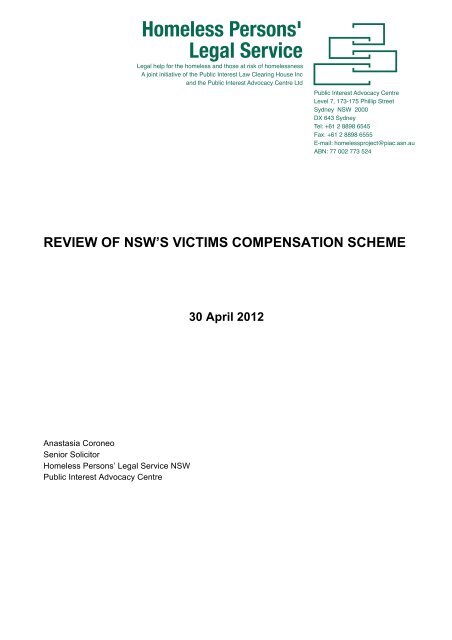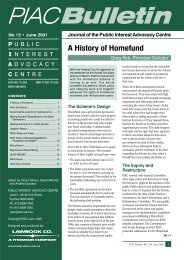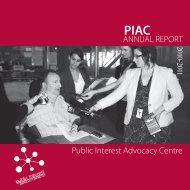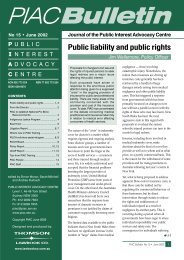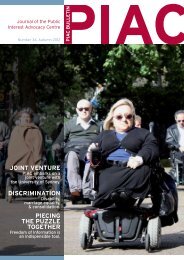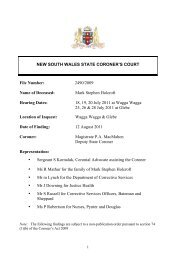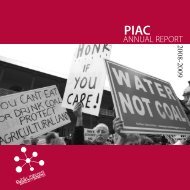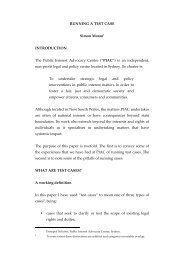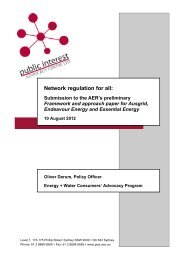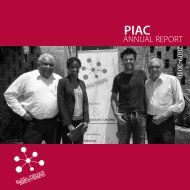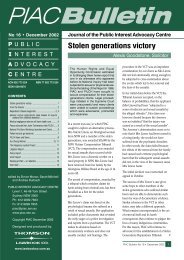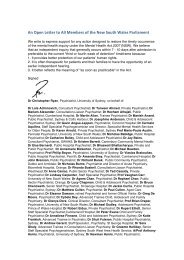Review of NSW's Victims Compensation Scheme - Public Interest ...
Review of NSW's Victims Compensation Scheme - Public Interest ...
Review of NSW's Victims Compensation Scheme - Public Interest ...
You also want an ePaper? Increase the reach of your titles
YUMPU automatically turns print PDFs into web optimized ePapers that Google loves.
!"#$%$&&'($)&"*&+'<br />
,$-.%'/$)012$'<br />
!"#$%&'"%(&)*+&,'"&'*-"%"..&$/0&,'*."&$,&+1.2&*)&'*-"%"../"..&<br />
3&4*1/,&1/1,1$,15"&*)&,'"&678%19&:/,"+".,&!$;&0/">&&FEG&&HIII<br />
JK&LMB&E>0/"><br />
N"%O&PLA&H&QQRQ&LDMD<br />
S$TO&PLA&H&QQRQ&LDDD<br />
UC-$1%O&'*-"%"..(+*4"9,V(1$9W$./W$7<br />
3XFO&??&IIH&??B&DHM&<br />
REVIEW OF NSW’S VICTIMS COMPENSATION SCHEME<br />
30 April 2012<br />
Anastasia Coroneo<br />
Senior Solicitor<br />
Homeless Persons’ Legal Service NSW<br />
<strong>Public</strong> <strong>Interest</strong> Advocacy Centre
Introduction<br />
Homeless Persons’ Legal Service<br />
In 2004, following an extensive consultation process, the Homeless Persons’ Legal Service<br />
(HPLS) was established by the <strong>Public</strong> <strong>Interest</strong> Advocacy Centre (PIAC) and the <strong>Public</strong> <strong>Interest</strong><br />
Law Clearing House (PILCH) NSW. 1 HPLS is largely funded by the NSW <strong>Public</strong> Purpose Fund<br />
with the support <strong>of</strong> the NSW Attorney General.<br />
HPLS provides free legal advice and ongoing representation to people who are homeless or at risk<br />
<strong>of</strong> homelessness. It operates ten clinics on a roster basis at welfare agencies in the greater<br />
Sydney area. 2 These agencies provide direct services, such as food and accommodation, to<br />
people in housing crisis. The clinics are co-ordinated by HPLS and staffed by lawyers acting pro<br />
bono from PILCH members. 3 Since its launch in May 2004, HPLS has provided advice to over<br />
4,500 clients. During 2010-2011, HPLS helped 738 clients.<br />
This submission provides case studies from HPLS casework. These case studies have been ‘deidentified’<br />
so as not to disclose the identity <strong>of</strong> the people referred to.<br />
HPLS is grateful to the pro bono assistance <strong>of</strong> Allens Arthur Robinson in preparing this submission.<br />
PIAC is solely responsible for the content <strong>of</strong> this submission.<br />
PIAC and HPLS’s work on <strong>Review</strong> <strong>of</strong> NSW’s <strong>Victims</strong><br />
<strong>Compensation</strong> <strong>Scheme</strong><br />
The Homeless Persons Legal Service is grateful for the opportunity to make this submission<br />
regarding the NSW <strong>Victims</strong> <strong>Compensation</strong> <strong>Scheme</strong> <strong>Review</strong>.<br />
Summary <strong>of</strong> recommendations<br />
Recommendation 1<br />
HPLS recommends that the review <strong>of</strong> the <strong>Victims</strong> <strong>Compensation</strong> <strong>Scheme</strong> accommodate the needs<br />
<strong>of</strong> people experiencing homelessness, given that these people face a very high likelihood <strong>of</strong> falling<br />
victim to violence and lack the other resources to cope with this. HPLS recommends that the<br />
<strong>Scheme</strong> retain sufficient flexibility to ensure that homeless people are able to reasonably access<br />
assistance under the <strong>Scheme</strong>.<br />
1<br />
2<br />
3<br />
Further information about PIAC and PILCH NSW is provided as Appendix A to this document.<br />
The clinics are hosted by the following welfare agencies: Edward Eagar Lodge (Wesley Mission),<br />
Matthew Talbot Hostel (St Vincent de Paul Society), Newtown Mission in Partnership with Newtown<br />
Neighbourhood Centre, Norman Andrews House (Uniting Care), Parramatta Mission (Uniting Church),<br />
Streetlevel Mission (Salvation Army), The Station, Vincentian House (St Vincent de Paul Society),<br />
Wayside Chapel (Uniting Church), and Women’s and Girls’ Emergency Centre. The City <strong>of</strong> Sydney<br />
also hosts the monthly Woolloomooloo Integrated Services Hub, which HPLS attends.<br />
The following PILCH NSW members provide lawyers on a pro bono basis to HPLS to provide legal<br />
services through the clinics: Allens Arthur Robinson, Baker & McKenzie, Corrs Chambers Westgarth,<br />
Dibbs Barker, HWL Ebsworth, Gilbert + Tobin, Henry Davis York, Legal Aid NSW, Minter Ellison,<br />
Norton Rose and Thomsons Lawyers.
Recommendation 2<br />
Lump sum payments assist clients in gaining a sense <strong>of</strong> acknowledgement and closure for the<br />
violent act. If there is concern that lump sum payments are not being spent in accordance with<br />
their intended purpose <strong>of</strong> providing support and rehabilitation, HPLS recommends that payment by<br />
instalments could be a better option, in conjunction with closer case management and coordination<br />
<strong>of</strong> services.<br />
HPLS recommends increased rehabilitation and support services for victims <strong>of</strong> violent crimes.<br />
However, HPLS recommends that in order to be effective, services be intensively and proactively<br />
case managed by <strong>Victims</strong> Services in an “assertive outreach” service delivery format.<br />
HPLS is aware that increasing the capacity <strong>of</strong> victims services to this extent would necessitate cuts<br />
elsewhere in the budget. HPLS suggests that one way <strong>of</strong> doing so would be to reserve payments<br />
<strong>of</strong> lump sum compensation to cases where the applicant has suffered a permanent injury or<br />
ongoing impairment (including Category 1 or 2 psychiatric injury), or to limit the categories <strong>of</strong><br />
violent crimes that attract a compensation payment (eg, restrict to sexual assault). Alternatively,<br />
HPLS suggests that eligibility to receive lump sum payments for non-permanent injuries could<br />
include a means test.<br />
Recommendation 3<br />
HPLS recommends that provision be made in the <strong>Victims</strong> <strong>Compensation</strong> <strong>Scheme</strong> for emergency<br />
accommodation and transport in appropriate circumstances, to mitigate the ongoing trauma and<br />
effects <strong>of</strong> a violent act. HPLS recommends that assistance with finding and paying for emergency<br />
accommodation should be provided by <strong>Victims</strong> Services as a separate service, rather than being<br />
bundled up generally within an “interim” compensation payment.<br />
Recommendation 4<br />
HPLS recommends against the imposition <strong>of</strong> a 20-year ‘final limitation’ period. However, in the<br />
event that such a provision is adopted is imposed, HPLS strongly recommends that some guided<br />
discretion should be maintained to grant extensions in exceptional cases.<br />
Recommendation 5<br />
HPLS recommends that the existing discretions in the Act regarding limitation periods (s 26) should<br />
be retained.<br />
To minimise problems with late applications, HPLS recommends that better access to <strong>Victims</strong><br />
Services should be provided at early and obvious points <strong>of</strong> contact, by providing outreach workers<br />
in hospitals and police stations.<br />
Recommendation 6<br />
HPLS recommends that the inclusive factors and ultimate discretion provided in s 30(2) regarding<br />
reports to police should not be altered. HPLS does not believe a police report should be a<br />
mandatory precondition to eligibility to the scheme, as it is in the UK jurisdiction.<br />
Recommendation 7<br />
HPLS recommends that the existing discretions in s 30 <strong>of</strong> the Act be retained. HPLS strongly<br />
recommends against medical records being a mandatory pre-requisite to seeking victims<br />
compensation as there may be reasons why a homeless person has not sought medical attention,<br />
and there may be other forms <strong>of</strong> evidence that can establish nature and extent <strong>of</strong> injury.<br />
Recommendation 8<br />
Homeless Personsʼ Legal Service <strong>Review</strong> <strong>of</strong> NSWʼs <strong>Victims</strong> <strong>Compensation</strong> <strong>Scheme</strong> 3
Any restrictions to assistance from <strong>Victims</strong> Services on the basis <strong>of</strong> previous (or future) unrelated<br />
criminal convictions would unfairly discriminate against homeless people.<br />
HPLS recommends that no other criminal history <strong>of</strong> the victim should be taken into account in<br />
reducing or <strong>of</strong>fsetting the award, beyond what already exists in ss 30 and 31 <strong>of</strong> the current Act.<br />
Protection <strong>of</strong> vulnerable victims<br />
Prevalence <strong>of</strong> violence in our client base<br />
HPLS accepts that independent assessment <strong>of</strong> the <strong>Victims</strong> <strong>Compensation</strong> <strong>Scheme</strong> has found that<br />
the <strong>Scheme</strong> is currently financially unsustainable and that a range <strong>of</strong> significant changes should be<br />
considered by the NSW Government.<br />
On the basis <strong>of</strong> our experience providing legal advice and assistance to people experiencing<br />
homelessness, HPLS is aware <strong>of</strong> the importance <strong>of</strong> the <strong>Victims</strong> <strong>Compensation</strong> <strong>Scheme</strong> –<br />
especially for HPLS’s client group. People experiencing homelessness are disproportionately<br />
represented among victims <strong>of</strong> violent crime; the difficulty in dealing with this experience is<br />
exacerbated by the fact that homelessness frequently leaves one with few social supports or<br />
financial means. In view <strong>of</strong> this, any changes to the <strong>Scheme</strong> should be made with caution and, in<br />
particular, the <strong>Scheme</strong> should ensure that it provides meaningful assistance to people<br />
experiencing homelessness.<br />
The level <strong>of</strong> violence experienced by homeless people is truly shocking. A 2007 study undertaken<br />
in Sydney found that 48% <strong>of</strong> 106 homeless respondents had suffered at least one episode <strong>of</strong><br />
violence in the previous year. 4 By contrast, among the housed population, 5% had been the victim<br />
<strong>of</strong> violence within that same period <strong>of</strong> time. 5<br />
The Rough Living, Surviving Violence and Homelessness report, published by UTS and PIAC in<br />
2010, documented the considerable links between violence, trauma and homelessness, and<br />
detailed how a range <strong>of</strong> services (including specialist homeless services) do not understand or<br />
seek to address the trauma experienced by these individuals. The Report also examined the<br />
impact <strong>of</strong> this service failure on the individuals interviewed in the study. The Report advocated that<br />
services should become better at recognising the effects <strong>of</strong> violence and trauma on homelessness<br />
and perpetuation <strong>of</strong> that cycle. 6<br />
Any scaling back <strong>of</strong> the <strong>Victims</strong> <strong>Compensation</strong> <strong>Scheme</strong> will have an impact on our clients. 13% <strong>of</strong><br />
HPLS’s current open case files (29 out <strong>of</strong> 224) relate to <strong>Victims</strong> <strong>Compensation</strong> applications. In the<br />
last 12 months, HPLS advised in 563 matters, 23 <strong>of</strong> which related to <strong>Victims</strong> <strong>Compensation</strong>. 17 <strong>of</strong><br />
these became ongoing casework files.<br />
4<br />
5<br />
6<br />
Study conducted by Larney S, Conroy, E, Mills, K, Burns, L and Teesson, M 2009, ‘Factors associated<br />
with violent victimisation among homeless adults in Sydney, Australia’, Australian and New Zealand<br />
Journal <strong>of</strong> <strong>Public</strong> Health, vol. 33, no 4, pp. 347-51 at p. 349, referred to by Catherine Robinson, Rough<br />
Living, Surviving Violence and Homelessness, 2010 at p. 15. Available at<br />
http://www.piac.asn.au/publication/2011/01/rough-living<br />
Figure recorded by the NSW Crime and Safety Survey (Australian Bureau <strong>of</strong> Statistics 2007, cat. No.<br />
4509.1 p.3).<br />
Catherine Robinson, Rough Living, Surviving Violence and Homelessness, 2010 at p. 15. Available at<br />
http://www.piac.asn.au/publication/2011/01/rough-living<br />
4 Homeless Personsʼ Legal Service <strong>Review</strong> <strong>of</strong> NSWʼs <strong>Victims</strong> <strong>Compensation</strong> <strong>Scheme</strong>
Recommendation 1<br />
HPLS recommends that the review <strong>of</strong> the <strong>Victims</strong> <strong>Compensation</strong> <strong>Scheme</strong> accommodate the needs<br />
<strong>of</strong> people experiencing homelessness, given that these people face a very high likelihood <strong>of</strong> falling<br />
victim to violence and lack the other resources to cope with this. HPLS recommends that the<br />
<strong>Scheme</strong> retain sufficient flexibility to ensure that homeless people are able to reasonably access<br />
assistance under the <strong>Scheme</strong>.<br />
Meeting the Objectives <strong>of</strong> the <strong>Scheme</strong><br />
<strong>Compensation</strong> payments vs <strong>Victims</strong> Services<br />
Lump Sum payments<br />
While many <strong>of</strong> our clients apply for interim payments, and 10 hours <strong>of</strong> free counseling through the<br />
<strong>Scheme</strong>, it is our experience that most clients seek to access the scheme to apply for lump sum<br />
payments for injuries. HPLS assists in gathering evidence and making submissions as to what<br />
injuries have been sustained, and determining whether the threshold has been reached.<br />
Generally speaking, clients have been satisfied to receive a lump sum through the <strong>Scheme</strong>. While<br />
HPLS does not collect information about how recipients ultimately spend this money, there is no<br />
question that, for HPLS clients who are <strong>of</strong> limited financial means, this money is hugely significant<br />
and has real potential to assist them in coping with their experience.<br />
Case study: Lump Sum payments received with gratitude and sense <strong>of</strong> closure<br />
An HPLS client obtained 10 hours <strong>of</strong> free counseling and received an award <strong>of</strong> approximately<br />
$17,000 for a Category 1 psychological injury sustained from a deprivation <strong>of</strong> liberty<br />
(kidnapping) and assault by her ex-partner. She had been unable to work for a long period<br />
following the assault as a result <strong>of</strong> her ongoing psychological injury. She also received a<br />
modest amount from <strong>Victims</strong> Services for her loss <strong>of</strong> income.<br />
She stated that she was grateful to receive the award and to receive an acknowledgement <strong>of</strong><br />
the trauma she had experienced. At the time <strong>of</strong> receiving the award, she said that she felt<br />
she could now move on with her life and that the money she had received would assist her to<br />
do so.<br />
HPLS is aware <strong>of</strong> Paul Sheehan’s timely opinion piece citing information from a police insider that<br />
drug circles and criminals are using the <strong>Victims</strong> <strong>Compensation</strong> <strong>Scheme</strong> to fund drug debt. 7 We<br />
endorse the Attorney General's focus on maintaining the financial probity and efficiency <strong>of</strong> the<br />
<strong>Scheme</strong>. However, HPLS is aware <strong>of</strong> no evidence that drug addicts or criminals are deliberately<br />
submitting to being shot in the leg by their creditors as a means <strong>of</strong> obtaining a victims'<br />
compensation payment to pay their debt. There is no evidence that any such practice goes<br />
beyond a few isolated cases that Mr Sheehan has obtained through his sources. The <strong>Scheme</strong>'s<br />
7<br />
Sheehan, P “Crooks play the victim for cash – it’s a crime”, Sydney Morning Herald, 30 April 2012.<br />
http://www.smh.com.au/opinion/crooks-play-the-victim-for-cash--its-a-crime-20120429-<br />
1xspx.html#ixzz1tU4ujSdK<br />
Homeless Personsʼ Legal Service <strong>Review</strong> <strong>of</strong> NSWʼs <strong>Victims</strong> <strong>Compensation</strong> <strong>Scheme</strong> 5
schedule <strong>of</strong> injuries is highly unlikely to make such an approach financially rewarding and the Act<br />
already has provision to exclude payment <strong>of</strong> compensation in circumstances where the victim’s<br />
behavior (including past criminal activity) contributed to the injury, and where the victim<br />
participated, encouraged or otherwise gave assistance to any person in the commission <strong>of</strong> the act<br />
<strong>of</strong> violence. 8<br />
While HPLS supports a prudent approach to the deployment <strong>of</strong> funds in the <strong>Scheme</strong>, any further<br />
measures designed to address the problem suggested by Mr Sheehan should be very carefully<br />
tailored to ensure that they do not have unintended negative consequences in respect <strong>of</strong><br />
vulnerable and deserving victims.<br />
“Support and Rehabilitation”<br />
HPLS submits that the objectives <strong>of</strong> the Act would be best achieved by a greater emphasis on<br />
“support and rehabilitation” than is provided by the current scheme. It would be beneficial for our<br />
clients to have the opportunity to be linked in with services to assist them with mental health, drug<br />
addiction, housing and other social services. However, it is also HPLS’s general experience that<br />
homeless clients have difficulty engaging and staying with services without intensive support.<br />
HPLS is mindful <strong>of</strong> the capacity constraints <strong>of</strong> many services and the limitations in their mode <strong>of</strong><br />
service provision. HPLS would support the establishment <strong>of</strong> a designated unit within <strong>Victims</strong><br />
Services to case manage payments <strong>of</strong> assistance and co-ordinate the provision <strong>of</strong> necessary<br />
services, to ensure that the scheme is fulfilling its legislated purpose <strong>of</strong> assisting with support and<br />
rehabilitation <strong>of</strong> victims. We would strongly urge any such designated unit to be resourced to<br />
provide intensive assistance and assertive outreach work.<br />
Case Study: Need for greater coordination <strong>of</strong> service delivery and case management<br />
An HPLS client was the victim <strong>of</strong> an armed robbery at his workplace. He was subsequently<br />
diagnosed with severe post-traumatic stress disorder. His application to <strong>Victims</strong> Services has<br />
been put on hold until he finalises his lump sum claim for workers’ compensation. He can only<br />
receive that lump sum payment once he reaches “maximum medical improvement”. His<br />
psychiatrist has formed the view that he has not reached this point and has recommended that<br />
he continue treatment sessions with his psychologist. However, he has not been attending<br />
those treatment sessions, and therefore both his workers’ compensation lump sum claim and<br />
8<br />
<strong>Victims</strong> Support and Rehabilitation Act 1996 (NSW) Section s. 30 Reasons for not making award or<br />
for reducing amount <strong>of</strong> compensation payable<br />
(1) In determining whether or not to make an award <strong>of</strong> statutory compensation and in determining the<br />
amount <strong>of</strong> compensation to award, the compensation assessor must have regard to the following:<br />
(a) any behaviour (including past criminal activity), condition, attitude or disposition <strong>of</strong> the primary or<br />
secondary victim concerned that directly or indirectly contributed to the injury or death sustained by<br />
the victim,<br />
(b) whether the act <strong>of</strong> violence was reported to a police <strong>of</strong>ficer within a reasonable time,<br />
(b1) whether the act <strong>of</strong> violence was reported to a relevant health pr<strong>of</strong>essional or practitioner, or a<br />
relevant agency,<br />
(c) whether that victim participated in the commission <strong>of</strong> the act <strong>of</strong> violence, encouraged another<br />
person to commit the act <strong>of</strong> violence or otherwise gave assistance to any person by whom the act <strong>of</strong><br />
violence was committed<br />
6 Homeless Personsʼ Legal Service <strong>Review</strong> <strong>of</strong> NSWʼs <strong>Victims</strong> <strong>Compensation</strong> <strong>Scheme</strong>
his victims compensation claim are at a stalemate.<br />
Case Study: Need for more intensive support services<br />
HPLS is assisting a homeless man who was violently attacked by an unknown person while he<br />
was sleeping. He suffers from severe depression. On two occasions, HPLS lawyers have<br />
arranged counselling appointments for him with a counsellor allocated by <strong>Victims</strong> Services.<br />
Despite his lawyers advising him <strong>of</strong> the date, time and location <strong>of</strong> the appointments, he has not<br />
attended the appointments. He has not answered his phone when his lawyers have attempted<br />
to call him the day before to remind him <strong>of</strong> his next appointment.<br />
Recommendation 2<br />
Lump sum payments assist clients in gaining a sense <strong>of</strong> acknowledgement and closure for the<br />
violent act. If there is concern that lump sum payments are not being spent in accordance with<br />
their intended purpose <strong>of</strong> providing support and rehabilitation, HPLS recommends that payment by<br />
instalments could be a better option, in conjunction with closer case management and coordination<br />
<strong>of</strong> services. 9<br />
HPLS recommends increased rehabilitation and support services for victims <strong>of</strong> violent crimes.<br />
However, HPLS recommends that in order to be effective, services be intensively and proactively<br />
case managed by <strong>Victims</strong> Services in an “assertive outreach” service delivery format.<br />
HPLS is aware that increasing the capacity <strong>of</strong> victims services to this extent would necessitate cuts<br />
elsewhere in the budget. HPLS suggests that one way <strong>of</strong> doing so would be to reserve payments<br />
<strong>of</strong> lump sum compensation to cases where the applicant has suffered a permanent injury or<br />
ongoing impairment (including Category 1 or 2 psychiatric injury), or to limit the categories <strong>of</strong><br />
violent crimes that attract a compensation payment (eg, restrict to sexual assault). Alternatively,<br />
HPLS suggests that eligibility to receive lump sum payments for non-permanent injuries could<br />
include a means test.<br />
Emergency accommodation and transport<br />
HPLS submits that it would be very beneficial for the <strong>Victims</strong> <strong>Compensation</strong> <strong>Scheme</strong> to provide for<br />
emergency accommodation and transport in appropriate circumstances following violent acts – as<br />
is the best practice in some other jurisdictions. For example, in Victoria, financial assistance may<br />
be awarded for safety-related expenses that are reasonably likely to be incurred in the future. 10<br />
These include relocation costs and the costs <strong>of</strong> emergency accommodation. In Queensland, a<br />
victim may be eligible for “special assistance in relation to an act <strong>of</strong> violence”, 11 which can cover<br />
the costs associated with emergency accommodation in limited circumstances (such as domestic<br />
violence cases).<br />
Case Study: Need for emergency accommodation following an act <strong>of</strong> violence<br />
HPLS assisted a man who was stabbed multiple times at a residence where he was couchsurfing.<br />
The perpetrator was charged with attempted murder. The attack caused not only<br />
9<br />
10<br />
11<br />
The Victorian <strong>Victims</strong> <strong>Compensation</strong> scheme allows for payment by instalments to the applicant<br />
themselves or to another person (eg, counsellor): <strong>Victims</strong> <strong>of</strong> Crime Assistance Act 1996 (Vic) s 55(1).<br />
<strong>Victims</strong> <strong>of</strong> Crime Assistance Act 1996 (Vic) s 8(2)(e).<br />
<strong>Victims</strong> <strong>of</strong> Crime Assistance Act 2009 (Qld) s 39(h).<br />
Homeless Personsʼ Legal Service <strong>Review</strong> <strong>of</strong> NSWʼs <strong>Victims</strong> <strong>Compensation</strong> <strong>Scheme</strong> 7
life-threatening physical injuries, but also post-traumatic stress disorder. He had nowhere to<br />
stay after his assault and didn’t feel safe anywhere. The assault had caused him to lose<br />
trust for other people and his mental health suffered. He was eventually asked to leave a<br />
crisis accommodation service after making threats to harm others, and he had nowhere else<br />
to go.<br />
Case Study: Need for emergency accommodation for victims <strong>of</strong> domestic violence<br />
HPLS assisted a man who suffered domestic violence by his female partner over a period <strong>of</strong><br />
several years. The abuse was physical and also involved stalking and harassment, and<br />
several (but not all) incidents had come to the attention <strong>of</strong> the police. When the man finally<br />
left the abusive relationship, he was rendered homeless. As a result, he lost a number <strong>of</strong><br />
useful documents and records, which would have been necessary to support his victims<br />
compensation application. He is now in the process <strong>of</strong> gathering evidence, such as<br />
payslips and letters from former employers about time taken <strong>of</strong>f work to substantiate his<br />
claim for economic loss. Emergency accommodation and a place to store his belongings<br />
would have assisted him in a number <strong>of</strong> ways, including to retain the essential paperwork<br />
that he needed in support <strong>of</strong> his application to <strong>Victims</strong> Services.<br />
Recommendation 3<br />
HPLS recommends that provision be made in the <strong>Victims</strong> <strong>Compensation</strong> <strong>Scheme</strong> for emergency<br />
accommodation and transport in appropriate circumstances, to mitigate the ongoing trauma and<br />
effects <strong>of</strong> a violent act. HPLS recommends that assistance with finding and paying for emergency<br />
accommodation should be provided by <strong>Victims</strong> Services as a separate service, rather than being<br />
bundled up generally within an “interim” compensation payment.<br />
Eligibility criteria<br />
HPLS does not support any further constriction <strong>of</strong> the eligibility criteria to the <strong>Scheme</strong>. Many <strong>of</strong><br />
HPLS’s clients do report the act <strong>of</strong> violence to police straight away, assist with prosecution <strong>of</strong> the<br />
<strong>of</strong>fender, and seek prompt medical assistance and timely legal advice. However, for a variety <strong>of</strong><br />
reasons (some wholly out <strong>of</strong> the control <strong>of</strong> our clients), many do not.<br />
Many HPLS clients <strong>of</strong>ten have trouble satisfying the current requirements <strong>of</strong> the <strong>Scheme</strong> as they<br />
tend to live chaotic lives, are wary or anxious about dealing with the police, are unlikely to keep<br />
records, and have minimal knowledge <strong>of</strong> their rights and obligations under statutory schemes such<br />
as <strong>Victims</strong> <strong>Compensation</strong>. For those with serious underlying medical conditions, this can also<br />
make it difficult to navigate the <strong>Scheme</strong>’s administrative arrangements.<br />
It is particularly difficult for many HPLS clients to meet the <strong>Scheme</strong>'s current requirements in:<br />
1. making applications within the two-year statutory time limit;<br />
2. reporting matters to police and assisting with the prosecution <strong>of</strong> the <strong>of</strong>fender;<br />
3. obtaining medical records; and<br />
8 Homeless Personsʼ Legal Service <strong>Review</strong> <strong>of</strong> NSWʼs <strong>Victims</strong> <strong>Compensation</strong> <strong>Scheme</strong>
4. attending hospital and follow-up appointments for assessment, treatment and stabilisation<br />
<strong>of</strong> their injuries.<br />
Limitation periods<br />
20-year “final limitation” date<br />
HPLS does not support the Chairperson’s recommendation in respect <strong>of</strong> the 20-year “final<br />
limitation” date. HPLS notes that no “final limitation” date exists in Victoria, Queensland, or the<br />
Northern Territory.<br />
HPLS submits that exceptions to any proposed 20-year limitation period should be allowed in<br />
certain circumstances, such as when evidence <strong>of</strong> the violent act is still obtainable (through medical<br />
records, court records and/or police reports), where the person demonstrates ongoing impairment<br />
as a result <strong>of</strong> the violent act, or where exceptional personal circumstances justify the extension.<br />
HPLS submits that this would not place undue strain on <strong>Victims</strong> Services’ resources as the number<br />
<strong>of</strong> potential applicants in these categories would be very few.<br />
Links between childhood abuse and homelessness<br />
HPLS notes the recent reported preliminary findings <strong>of</strong> the Journeys Home Project, conducted by<br />
the Melbourne Institute <strong>of</strong> Applied Economic and Social Research, commissioned by the Federal<br />
Government. 12<br />
That study has found that two-thirds <strong>of</strong> people in a national study <strong>of</strong> homelessness suffered<br />
physical or sexual violence as children or had been neglected or emotionally abused. About onethird<br />
had been sexually assaulted. 13<br />
HPLS submits that the far-reaching and long-term effects <strong>of</strong> violence perpetrated upon children,<br />
manifesting in chronic homelessness in later life, should be recognised by the <strong>Victims</strong><br />
<strong>Compensation</strong> <strong>Scheme</strong>. As the main objective <strong>of</strong> the <strong>Scheme</strong> is to provide support and<br />
rehabilitation for victims <strong>of</strong> crimes <strong>of</strong> violence, HPLS submits that the <strong>Victims</strong> <strong>Compensation</strong><br />
<strong>Scheme</strong> should not create any further obstructions or restrictions to such victims in accessing the<br />
scheme. The essential problem <strong>of</strong> homelessness (not having stable accommodation) is frequently<br />
partnered with addiction, mental illness, and disengagement from services. In our experience,<br />
people experiencing homelessness have different priorities <strong>of</strong> need, which means that they<br />
struggle to address longer-term issues including legal matters.<br />
HPLS strongly urges NSW not to follow the UK in intentionally restricting claims for childhood<br />
sexual assault that occurred within families before 1979. 14<br />
Recommendation 4<br />
HPLS recommends against the imposition <strong>of</strong> a 20-year ‘final limitation’ period. However, in the<br />
event that such a provision is adopted is imposed, HPLS strongly recommends that some guided<br />
discretion should be maintained to grant extensions in exceptional cases.<br />
12<br />
13<br />
14<br />
http://www.melbourneinstitute.com/journeys_home/<br />
Horin, A “Abuse as a child linked to longer term homelessness”, Sydney Morning Herald, 19 April<br />
2012. http://www.smh.com.au/opinion/political-news/abuse-as-a-child-linked-to-longer-termhomeless-20120418-1x7hx.html#ixzz1suIkjKpr<br />
Criminal Injuries <strong>Compensation</strong> <strong>Scheme</strong> (2008), paragraph 6.<br />
Homeless Personsʼ Legal Service <strong>Review</strong> <strong>of</strong> NSWʼs <strong>Victims</strong> <strong>Compensation</strong> <strong>Scheme</strong> 9
General 2-year limitation period<br />
HPLS submits that current legislative provisions relating to the general two-year limitation period to<br />
lodge applications should be retained. HPLS does not support any removal <strong>of</strong> the existing<br />
discretions to grant extensions <strong>of</strong> time. Many clients who experience homelessness have suffered<br />
family breakdown and domestic violence. HPLS has assisted several clients to claim assistance<br />
for domestic violence injuries outside the two-year limitation period. Further, as stated above, the<br />
personal circumstances <strong>of</strong> people who experience homelessness may give rise to several good<br />
reasons why an extension under s 26 <strong>of</strong> the Act may be appropriate.<br />
Case study: Why existing discretions regarding extensions to limitation period should<br />
be retained<br />
A homeless man sought legal advice about a number <strong>of</strong> matters, including victims<br />
compensation, a year after having had his hip broken in an assault by a group <strong>of</strong> people. After<br />
that initial consultation, the lawyers lost contact with him. Their letters to him were returned to<br />
sender. As a last attempt to find him, HPLS contacted Sentence Administration, who confirmed<br />
that he was in custody. HPLS then corresponded with the client in prison, assisting him to<br />
submit his form just within the two-year limitation period. He was subsequently awarded<br />
$18,000 in compensation.<br />
While this man was lucky to have made an initial inquiry and to have had a creative, proactive<br />
lawyer, others in similar circumstances may not be so fortunate.<br />
Recommendation 5<br />
HPLS recommends that the existing discretions in the Act regarding limitation periods (s 26) should<br />
be retained.<br />
To minimise problems with late applications, HPLS recommends that better access to <strong>Victims</strong><br />
Services should be provided at early and obvious points <strong>of</strong> contact, by providing outreach workers<br />
in hospitals and police stations.<br />
Reporting acts <strong>of</strong> violence to police within “reasonable time”<br />
There are many reasons why HPLS clients may not report an act <strong>of</strong> violence to police. Some <strong>of</strong><br />
our clients have a poor relationship with police as a result <strong>of</strong> their own criminal history or activity.<br />
Other clients have reported that they do not think that the police take their complaints seriously, as<br />
violence is unfortunately a common event on the streets. Still others may not have known about<br />
the <strong>Victims</strong> <strong>Compensation</strong> scheme at the time, and the importance <strong>of</strong> reporting the act <strong>of</strong> violence<br />
to police as a prerequisite to accessing it.<br />
Case Study: Difficulties in reporting acts <strong>of</strong> violence to police<br />
An HPLS client was assaulted in Sydney. His award was reduced on the basis that he<br />
delayed reporting the assault to police. On appeal, the client claimed the reason for the delay<br />
was because the first time he went to the police station to report the assault, the police told<br />
him to “bugger <strong>of</strong>f”. He was successful in his appeal.<br />
10 Homeless Personsʼ Legal Service <strong>Review</strong> <strong>of</strong> NSWʼs <strong>Victims</strong> <strong>Compensation</strong> <strong>Scheme</strong>
Recommendation 6<br />
HPLS recommends that the inclusive factors and ultimate discretion provided in s 30(2) regarding<br />
reports to police should not be altered. 15 HPLS does not believe a police report should be a<br />
mandatory precondition to eligibility to the scheme, as it is in the UK jurisdiction. 16<br />
Medical records and medical treatment<br />
Homeless people <strong>of</strong>ten have trouble obtaining their own medical records. This can be due to poor<br />
organisational skills and a different priority <strong>of</strong> needs. Some clients may not recall where they were<br />
treated for their injuries following a violent act, nor the precise nature <strong>of</strong> their injuries. There are<br />
instances where patients have absconded from hospital without a thorough diagnosis and<br />
treatment plan being implemented. This is <strong>of</strong>ten due to their decision-making skills being<br />
compromised by addiction or mental illness. In such cases, HPLS has had to seek evidence from<br />
other sources to establish the nature, cause and extent <strong>of</strong> the injury.<br />
Case Study: Limitations <strong>of</strong> medical records<br />
HPLS is assisting a man (Peter) who was assaulted in his sleep. Peter was unable to<br />
provide specific details about the injuries he sustained as a result <strong>of</strong> the violent act. He was<br />
admitted to hospital following the assault. The record states that a bystander reported that<br />
an unknown attacker had kicked and stomped on Peter’s head while he was sleeping and<br />
had punched him several times. The medical record noted head and facial injuries.<br />
However, Peter absconded from hospital before any thorough or extensive testing so the<br />
medical records do not document the extent <strong>of</strong> his injuries.<br />
Recommendation 7<br />
HPLS recommends that the existing discretions in s 30 be retained. 17 HPLS strongly recommends<br />
against medical records being a mandatory pre-requisite to seeking victims compensation as there<br />
may be reasons why a homeless person has not sought medical attention, and there may be other<br />
forms <strong>of</strong> evidence that can establish nature and extent <strong>of</strong> injury.<br />
15<br />
16<br />
17<br />
<strong>Victims</strong> Support and Rehabilitation Act 1996 (NSW) Section 30(2): In determining whether a matter<br />
relating to a victim was reported to a police <strong>of</strong>ficer within a reasonable time, the compensation<br />
assessor may have regard to such matters as the assessor considers relevant, including the following:<br />
(a) the age <strong>of</strong> the victim when the act <strong>of</strong> violence is alleged to have occurred,<br />
(b) any intellectual or psychiatric disability to which the victim is subject,<br />
(c) the nature <strong>of</strong> the relationship between the victim and the person or persons by whom the act <strong>of</strong><br />
violence is alleged to have been committed,<br />
(d) any fear <strong>of</strong> retaliation by any such person or persons to which the victim is subject,<br />
(e) the nature <strong>of</strong> any injury alleged to have been sustained by the victim.<br />
UK Criminal Injuries <strong>Compensation</strong> <strong>Scheme</strong> (200*) para 13(1)(a) and 13(1)(b).<br />
<strong>Victims</strong> Support and Rehabilitation Act 1996 (NSW) s 30(1) states:<br />
In determining whether or not to make an award <strong>of</strong> statutory compensation and in determining the<br />
amount <strong>of</strong> compensation to award, the compensation assessor must have regard to the following:<br />
…<br />
(b) whether the act <strong>of</strong> violence was reported to a relevant health pr<strong>of</strong>essional or practitioner, or a<br />
relevant agency, …<br />
(d) whether that victim failed to take reasonable steps to mitigate the extent <strong>of</strong> the injury sustained by<br />
the victim, such as seeking appropriate medical advice or treatment, or undertaking counselling, as<br />
soon as practicable after the act <strong>of</strong> violence was committed,<br />
(e) such other matters as the compensation assessor considers relevant.<br />
Homeless Personsʼ Legal Service <strong>Review</strong> <strong>of</strong> NSWʼs <strong>Victims</strong> <strong>Compensation</strong> <strong>Scheme</strong> 11
Criminal history<br />
It is our experience that homeless people <strong>of</strong>ten have criminal histories. HPLS notes with concern<br />
that in Victoria and the UK, an assessor may restrict or reduce victims’ compensation payments<br />
where the victim has a criminal history, including history <strong>of</strong> previous non-violent <strong>of</strong>fences. 18 HPLS<br />
submits that non-violent criminal history should be an irrelevant consideration in administering this<br />
legislation, which is specifically established to assist victims <strong>of</strong> violent crime. Whether the victim<br />
has previously been convicted <strong>of</strong> <strong>of</strong>fences (especially non-violent ones) is completely beside the<br />
point in this analysis.<br />
Such an amendment would disproportionately impact on people who are homeless. The links<br />
between trauma, abuse, poverty, homelessness, addiction and minor criminal <strong>of</strong>fending are all well<br />
recognised. Data gathered from the minor criminal matters conducted by the HPLS Solicitor<br />
Advocate in 2010-2011 showed that:<br />
53% <strong>of</strong> clients disclosed that they had a mental illness<br />
62% disclosed they had drug or alcohol dependency<br />
76% said they had either mental illness or drug/alcohol dependency<br />
38% disclosed they had both a mental illness and drug/alcohol dependency<br />
45% indicated they had previously been in prison.<br />
HPLS notes that the NSW legislation already has a provision for <strong>of</strong>f-setting victims compensation<br />
awards where the victim themselves is the subject <strong>of</strong> a restitution order, 19 and where the victim’s<br />
criminal conduct directly or indirectly contributed to their injury. 20 HPLS does not take issue with<br />
any <strong>of</strong> those provisions.<br />
Recommendation 8<br />
Any restrictions to assistance from <strong>Victims</strong> Services on the basis <strong>of</strong> previous (or future) unrelated<br />
criminal convictions would unfairly discriminate against homeless people.<br />
HPLS recommends that no other criminal history <strong>of</strong> the victim should be taken into account in<br />
reducing or <strong>of</strong>fsetting the award, beyond what already exists in ss 30 and 31 <strong>of</strong> the current Act.<br />
18<br />
19<br />
20<br />
<strong>Victims</strong> <strong>of</strong> Crime Assistance Act 1996 (Vic) s.24 states that the Tribunal must have regard to any<br />
relevant circumstances in determining whether to award, and what amount, including any past criminal<br />
activity <strong>of</strong> the victim and the number and nature <strong>of</strong> any findings <strong>of</strong> guilt or convictions; Criminal Injuries<br />
<strong>Compensation</strong> <strong>Scheme</strong> (UK) (2008) para 13(1), whereby the applicant’s character as shown by their<br />
criminal convictions, or by other evidence, makes it inappropriate that a full award or any award be<br />
made.<br />
<strong>Victims</strong> Support and Rehabilitation Act 1996 (NSW) s31.<br />
<strong>Victims</strong> Support and Rehabilitation Act 1996 (NSW) s30 (1) In determining whether or not to make an<br />
award <strong>of</strong> statutory compensation and in determining the amount <strong>of</strong> compensation to award, the<br />
compensation assessor must have regard to the following:<br />
(a) any behaviour (including past criminal activity), condition, attitude or disposition <strong>of</strong> the primary or<br />
secondary victim concerned that directly or indirectly contributed to the injury or death sustained by<br />
the victim, … and (c) whether that victim participated in the commission <strong>of</strong> the act <strong>of</strong> violence,<br />
encouraged another person to commit the act <strong>of</strong> violence or otherwise gave assistance to any person<br />
by whom the act <strong>of</strong> violence was committed, and section 30(4A) (4A) The compensation assessor<br />
may postpone the determination <strong>of</strong> a person’s application for statutory compensation pending the<br />
determination <strong>of</strong> another application for statutory compensation if the person has been convicted <strong>of</strong> an<br />
<strong>of</strong>fence that is a "relevant <strong>of</strong>fence" under section 46 in relation to that other application.<br />
12 Homeless Personsʼ Legal Service <strong>Review</strong> <strong>of</strong> NSWʼs <strong>Victims</strong> <strong>Compensation</strong> <strong>Scheme</strong>
Appendix A<br />
The <strong>Public</strong> <strong>Interest</strong> Advocacy Centre<br />
The <strong>Public</strong> <strong>Interest</strong> Advocacy Centre (PIAC) is an independent, non-pr<strong>of</strong>it law and policy<br />
organisation that works for a fair, just and democratic society, empowering citizens, consumers<br />
and communities by taking strategic action on public interest issues.<br />
PIAC identifies public interest issues and, where possible and appropriate, works co-operatively<br />
with other organisations to advocate for individuals and groups affected. PIAC seeks to:<br />
• expose and redress unjust or unsafe practices, deficient laws or policies;<br />
• promote accountable, transparent and responsive government;<br />
• encourage, influence and inform public debate on issues affecting legal and democratic rights;<br />
• promote the development <strong>of</strong> law that reflects the public interest;<br />
• develop and assist community organisations with a public interest focus to pursue the interests<br />
<strong>of</strong> the communities they represent;<br />
• develop models to respond to unmet legal need; and<br />
• maintain an effective and sustainable organisation.<br />
Established in July 1982 as an initiative <strong>of</strong> the (then) Law Foundation <strong>of</strong> New South Wales, with<br />
support from the NSW Legal Aid Commission, PIAC was the first, and remains the only, broadlybased<br />
public interest legal centre in Australia. Financial support for PIAC comes primarily from the<br />
NSW <strong>Public</strong> Purpose Fund and the Commonwealth and State Community Legal Services<br />
Program. PIAC receives funding from Industry & Investment NSW for its work on energy and<br />
water, and from Allens Arthur Robinson for the Indigenous Justice Program. PIAC also generates<br />
income from project and case grants, seminars, consultancy fees, donations and recovery <strong>of</strong> costs<br />
in legal actions.<br />
The <strong>Public</strong> <strong>Interest</strong> Law Clearing House<br />
The <strong>Public</strong> <strong>Interest</strong> Law Clearing House (PILCH) NSW was established in 1992 by the Law Society<br />
<strong>of</strong> New South Wales, the <strong>Public</strong> <strong>Interest</strong> Advocacy Centre and the private legal pr<strong>of</strong>ession to<br />
respond to the growing incidence <strong>of</strong> unmet legal needs within the community. Underlying the<br />
establishment <strong>of</strong> PILCH is the commitment from lawyers that the provision <strong>of</strong> legal services on a<br />
pro bono publico (‘for the public good’) basis is intrinsic to legal pr<strong>of</strong>essional responsibility.<br />
The aims <strong>of</strong> PILCH are:<br />
• to identify matters <strong>of</strong> public interest that warrant legal assistance pro bono publico;<br />
• to identify the legal needs <strong>of</strong> non-pr<strong>of</strong>it organisations;<br />
• to match disadvantaged and under-represented individuals, groups and non-pr<strong>of</strong>it<br />
organisations with a need for otherwise unavailable legal assistance with PILCH member firms<br />
and barristers;<br />
• to utilise the diverse skills and resources <strong>of</strong> lawyers in a broad range <strong>of</strong> public interest matters;<br />
• to expand the participation <strong>of</strong> private practitioners in the law reform process;<br />
• to seek the integration <strong>of</strong> pro bono work with legal practice;<br />
• to encourage co-operation between private practitioners and public interest lawyers: and
• to establish/coordinate public interest projects which seek systemic reform.<br />
PILCH provides services to community organisations and individuals for free. It is a membershipbased<br />
organisation with members including small, medium and large private law firms, corporate<br />
law departments, individual barristers, barristers’ chambers, law schools, accounting firms, Legal<br />
Aid NSW, the Law Society <strong>of</strong> NSW, the NSW Bar Association, and PIAC.<br />
14 Homeless Personsʼ Legal Service <strong>Review</strong> <strong>of</strong> NSWʼs <strong>Victims</strong> <strong>Compensation</strong> <strong>Scheme</strong>


